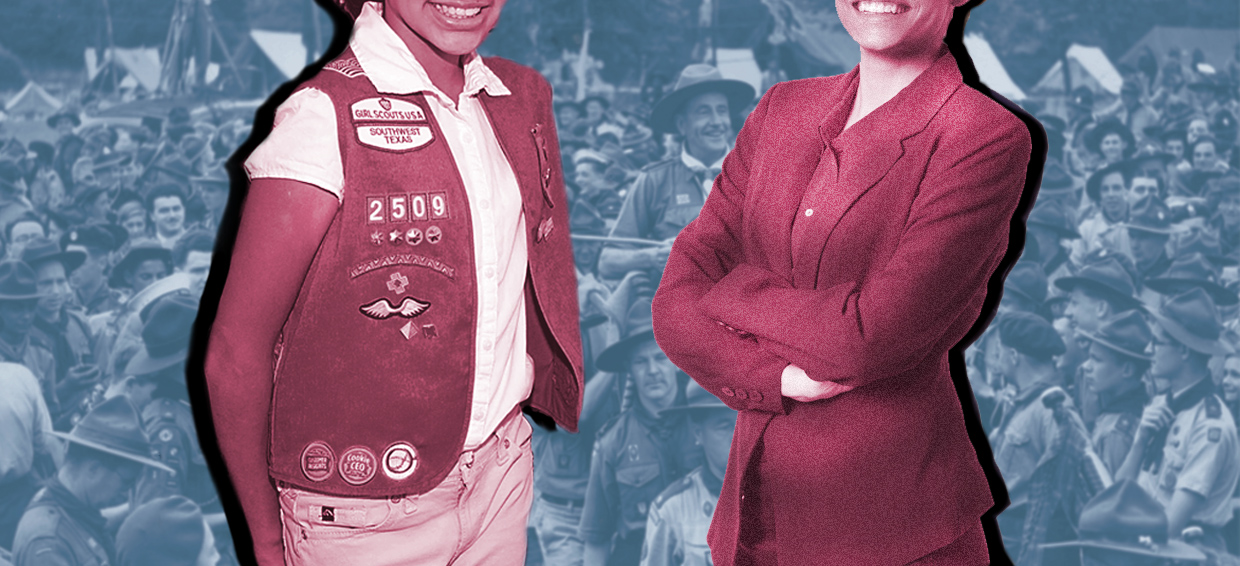Why women-only spaces still matter
Holding space for girls and women allows for much-needed empowerment and healing


A free daily email with the biggest news stories of the day – and the best features from TheWeek.com
You are now subscribed
Your newsletter sign-up was successful
"What do you think of the Boy Scouts admitting girls?"
It was the last day of The Compact, a California-based feminist summer camp for women and gender-variant adults, which I was attending. A half-dozen of us sat chatting around a picnic bench, enjoying the sun filtering through the redwoods. As the question hung in the air, there were sighs, groans, eye-rolls. The consensus was clear: "Just don't mess with the Girl Scouts. Please."
As of this month, the Boy Scouts of America is being officially rebranded as Scouts BSA. Since this shift was first announced in fall 2017, much of the national conversation has focused on a supposed rivalry with Girl Scouts USA. With a national scouting organization accepting both boys and girls, the implication goes, is an all-girls counterpart still needed?
The Week
Escape your echo chamber. Get the facts behind the news, plus analysis from multiple perspectives.

Sign up for The Week's Free Newsletters
From our morning news briefing to a weekly Good News Newsletter, get the best of The Week delivered directly to your inbox.
From our morning news briefing to a weekly Good News Newsletter, get the best of The Week delivered directly to your inbox.
My own Girl Scout career was short and unenthusiastic. It lasted less than a year; I don't recall if I even got a vest. But in recent years, I've come to crave the company of other women. The Compact, for me, was a chance to recapture some of what I missed out on in my youth, and a searing reminder of the importance of women-only spaces.
Privilege has a gravitational pull. Those who possess it become the center of any interaction in which they are present. When a man enters a room full of women, his experiences and viewpoints immediately define the conversation. Instinctively, unconsciously, the women in the room step back. They moderate their words. They watch for signs of discomfort and rush to soothe hurt feelings.
For many of us, this is the natural outcome of a lifetime of training. Girls learn to defer to boys, let boys behave as they will, cushion boys' feelings, and soften boys' falls. We learn to be calm, likable, pliable; we learn to doubt our own instincts and neglect our own needs in order to smooth the way for others. When we experience mistreatment and violence, we learn to blame ourselves.
Women-only spaces offer a respite from the pressure — and, often, trauma — wrought by that social conditioning. By temporarily removing cisgender men from the equation, organizations like Girl Scouts USA and The Compact allow women to put our own experiences front and center. When I was an adolescent, that felt transgressive and uncomfortable. As an adult, it feels like a lifeline.
A free daily email with the biggest news stories of the day – and the best features from TheWeek.com
I'm not alone in this. When I asked some of my fellow Compact attendees about their experiences in women-only spheres, I got a pile of eloquent responses. They cited everything from Girl Scouts, to women's high schools and colleges, to creative collectives, professional organizations, and coworking spaces. As they reflected on what these spaces have meant to them, a few common themes emerged:
Affirmation and recognition. One of the patriarchy's nastiest tricks is convincing women that our marginalization is all in our heads. More than once during The Compact, I saw full-grown adults burst into tears of relief after hearing someone say, "I have also lived through this. You are not alone." And being around others who "get it" gives us a much-needed break from the constant explaining, defending, clarifying, and apologizing of expressing a non-male perspective in a male-dominated society. Being able to communicate in social shorthand — to trust that every person around us implicitly understands and believes what we say — is something that men take for granted, and women simply cannot.
Safety. Multiple of my friends used the word "vulnerable" when describing their all-female experiences. They told story after story of opening up to near-strangers, trying activities they'd been embarrassed to express interest in, asking for help without fear of being dismissed as emotional or targeted as weak. Several also mentioned the absence of the male gaze, which reduces women to sexual objects and interprets our every move in service of male pleasure. We're steeped in that gaze, pressured at all times to modify our bodies and police our behavior. It's not often we get to simply exist in our own skin for a while, to un-self-consciously wear a swimsuit around a campsite or leave our makeup at home.
Access. The women I surveyed were unequivocal about the benefits of women's networks in arenas controlled by men. For example, men are still overwhelmingly the gatekeepers of the American workplace. Female mentors can answer questions and model behaviors that male mentors simply don't have context for, like how to walk the patriarchy-enforced line between "effective professional" and "unlikeable witch." Women's networks can counter implicit bias in recruitment and hiring, by connecting qualified female candidates with opportunities they might otherwise miss. And women-only spaces provide visibility for what women are accomplishing in male-dominated fields. They encourage participants to take risks, to learn new skills, to own and celebrate accomplishments — without the competitive (and often silencing) presence of men.
Intersectionality. While designating spaces for women is a start, it is by no means the be-all and end-all of dismantling oppression. These spaces must also be intersectional — that is, they must actively empower those who live at the intersections of multiple marginalized identities. The term "intersectionality" was coined to describe the experiences of black women in a sexist, racist society; for queer women, add homophobia to the mix; for disabled women, layer in ableism; and so on. Even under the umbrella of gender, not everyone who experiences marginalization in a patriarchal society identifies as female, and not every woman was assigned female at birth. These systems of oppression cannot be untangled. The best women's spaces recognize this, grapple with it, and commit to addressing systemic injustices across the spectrum of participants' experiences.
Whether the new Scouts BSA organization is truly equipped to support its non-male scouts remains to be seen. But in a society that elevates cisgender men at the expense of all others, it is vital that we create and defend spaces for those pushed to the margins.
Women-only spaces offer a profoundly different experience than co-ed ones. There is simply no substitute for these spaces; they are not competitors, but counterparts. For me, and many women I know, these spaces allow for the kind of empowerment and healing that is vanishingly rare in our day-to-day lives.
Zoe Fenson is a freelance writer based in the San Francisco Bay Area. Her writing has appeared in Longreads, Narratively, The New Republic, and elsewhere. When she's not writing, you'll find her doing crossword puzzles in cocktail bars or playing fetch with her cat.
-
 Switzerland could vote to cap its population
Switzerland could vote to cap its populationUnder the Radar Swiss People’s Party proposes referendum on radical anti-immigration measure to limit residents to 10 million
-
 Political cartoons for February 15
Political cartoons for February 15Cartoons Sunday's political cartoons include political ventriloquism, Europe in the middle, and more
-
 The broken water companies failing England and Wales
The broken water companies failing England and WalesExplainer With rising bills, deteriorating river health and a lack of investment, regulators face an uphill battle to stabilise the industry
-
 Walter Isaacson's 'Elon Musk' can 'scarcely contain its subject'
Walter Isaacson's 'Elon Musk' can 'scarcely contain its subject'The latest biography on the elusive tech mogul is causing a stir among critics
-
 Welcome to the new TheWeek.com!
Welcome to the new TheWeek.com!The Explainer Please allow us to reintroduce ourselves
-
 The Oscars finale was a heartless disaster
The Oscars finale was a heartless disasterThe Explainer A calculated attempt at emotional manipulation goes very wrong
-
 Most awkward awards show ever?
Most awkward awards show ever?The Explainer The best, worst, and most shocking moments from a chaotic Golden Globes
-
 The possible silver lining to the Warner Bros. deal
The possible silver lining to the Warner Bros. dealThe Explainer Could what's terrible for theaters be good for creators?
-
 Jeffrey Wright is the new 'narrator voice'
Jeffrey Wright is the new 'narrator voice'The Explainer Move over, Sam Elliott and Morgan Freeman
-
 This week's literary events are the biggest award shows of 2020
This week's literary events are the biggest award shows of 2020feature So long, Oscar. Hello, Booker.
-
 What She Dies Tomorrow can teach us about our unshakable obsession with mortality
What She Dies Tomorrow can teach us about our unshakable obsession with mortalityThe Explainer This film isn't about the pandemic. But it can help viewers confront their fears about death.
